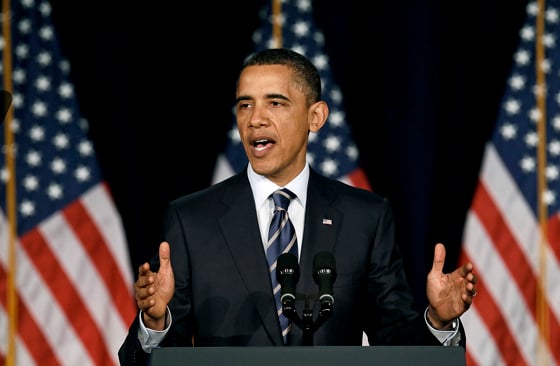Like the President, Republican leaders gave thumbs up to TARP, prescription drug plan, foreign wars; 'plenty of blame to go around'
House Speaker John Boehner often attacks the spendthrift ways of Washington.
“In Washington, more spending and more debt is business as usual,” the Republican leader from Ohio said in a televised address yesterday amid debate over the U.S. debt. “I've got news for Washington - those days are over.”
Yet the speaker, House Majority Leader Eric Cantor, House Budget Chairman Paul Ryan and Senate Minority Leader Mitch McConnell all voted for major drivers of the nation's debt during the past decade: Wars in Afghanistan and Iraq, the 2001 and 2003 Bush tax cuts and Medicare prescription drug benefits. They also voted for the Troubled Asset Relief Program, or TARP, that rescued financial institutions and the auto industry.
Together, a Bloomberg News analysis shows, these initiatives added $3.4 trillion to the nation's accumulated debt and to its current annual budget deficit of $1.5 trillion.
As Congress nears votes to raise the $14.3-trillion debt ceiling to avert a default on U.S. obligations when borrowing authority expires on Aug. 2, both parties are attempting to claim a mantle of fiscal responsibility. They both bear some of the blame: Many Democrats contributed to the expenses that are forcing lawmakers to boost the nation's debt limit, as have Republican leaders at odds over how much borrowing authority to hand President Barack Obama and when.
“There's plenty of blame to go around,” for the debt, said Robert Bixby, executive director of the Concord Coalition, an Arlington, Virginia-based group that advocates for balanced budgets. “If there had been no Barack Obama, we would still be bumping up against the debt limit.'”
Debt Has Doubled
Since 2001, the debt has grown from $5.8 trillion.
Republicans say the long-term growth of entitlement programs such as Social Security, Medicare and Medicaid, along with depressed tax revenues due to the worst recession since the Great Depression, drive the current debt level.
“Blaming Bush for the structural deficits we've known would come since the early 1990s is beyond irresponsible.” said Brad Dayspring, a spokesman for Cantor.
In his address yesterday, Boehner accused Obama of going on the “largest spending binge in American history.”
Obama's 2011 annual budget, Republicans note, drove federal spending to a record $3.8 trillion. Non-defense discretionary spending also grew by 24 percent during the first two years of the Obama administration, they say, adding $734 billion in spending over the next 10 years.
Recession Worsened Deficit
The recession, Obama said in a televised address from the White House yesterday, lowered revenue and required his administration to “spend even more” on tax cuts, unemployment insurance and state and local aide. “These emergency steps also added to the deficit,” he said.
Some Democrats also supported the Bush administration programs. In the Senate, Obama voted to finance the wars in Afghanistan and Iraq and TARP. He signed legislation extending the Bush-era tax cuts for two years in December.
“Both sides are claiming they're fiscally responsible,” said Rudolph Penner, director of the Congressional Budget Office under President Ronald Reagan. “But I don't see much difference in that regard.”
Bush Tax Cuts
The 2001 and 2003 tax cuts, which lowered tax rates on income, dividends and capital gains, increased the federal budget deficit by $1.7 trillion over a decade, according to the Center for Budget and Policy Priorities, a non-partisan left-of- center group in Washington that studies fiscal policy.
The two-year extension of those tax cuts that Obama signed will cost $857.8 billion, according to the Congressional Joint Committee on Taxation.
Boehner has defended the tax cuts, arguing that they didn't lead to the deficit.
“The revenue problem we have today is a result of what happened in the economic collapse some 18 months ago,” he told reporters on June 10, according to The Hill newspaper.
The wars in Afghanistan and Iraq have cost almost $1.3 trillion since the terrorist attacks on Sept. 11, 2001, according to a March 29 analysis by the Congressional Research Service. Operations in Iraq have cost $806 billion, and in Afghanistan $444 billion. The analysis shows the government has spent an additional $29 billion for enhanced security on militia bases and $6 billion remains unallocated.
Medicare Drug Benefit
The 2003 Medicare prescription program approved by President George W. Bush and a Republican-dominated Congress has cost $369 billion over a 10-year time frame, less than initially projected by Medicare actuaries.
Nine Senate Republicans, including Nebraska's Chuck Hagel, along with 25 Republicans in the House, voted against the bill. Hagel argued that it failed to control costs and would add trillions in debt for future generations.
“Republicans used to believe in fiscal responsibility,” Hagel wrote in a 2003 editorial in the Omaha World Herald. “We have lost our way.”
TARP, the $700-billion bailout of banks, insurance and auto companies, has cost less than expected. McConnell, Boehner, Cantor and Ryan all voted in October 2008 for the program, which stoked the rise of the Tea Party movement.
Many institutions have repaid the government. The latest estimated lifetime cost of the program is $49.33 billion, according to a June 2011 report by the Treasury Department. That figure includes the $45.61 billion cost of a housing program which the administration never expected to recoup.
Rank-and-file Republicans are eager to pin the blame on Democrats, frequently pointing to the economic stimulus signed by Obama in 2009. The total cost of the stimulus will be $830 billion by 2019, according to a May 2011 Congressional Budget Office report.
That's half the cost of the Bush tax cuts and less than two-thirds of what has been spent on the wars in Iraq and Afghanistan.
--Bloomberg News-







